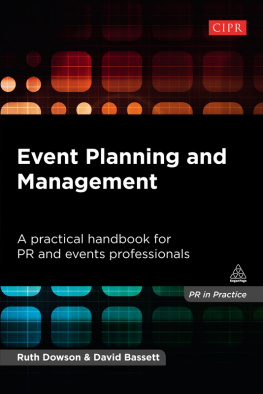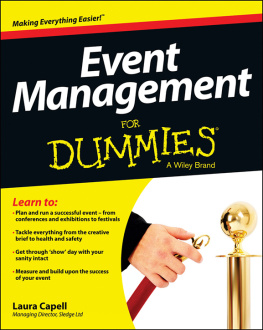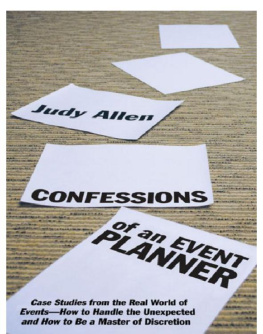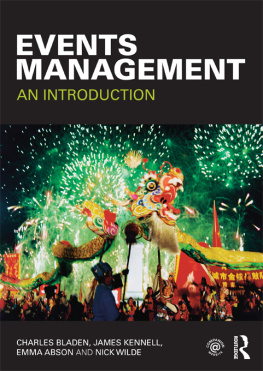T hank you to the following individuals without whose contributions and support this book would not have been written.
To Anne Gregory for inviting us to write this book and the team at Kogan Page for their efforts in publishing it.
To our wonderful colleagues and fantastic students (past and present) at the UK Centre for Events Management for inspiring us. Weve learned so much from you over the years, we thought we would return the favour. A special mention to our Bront Family, Dan, Bernie, Michelle, John, Richard and Anna for always being there (with cake!).
To Jakki for helping to plug the gap in our knowledge of social media.
To Eliza and Ivan for giving up your time to feedback on the drafts.
To Jeanette and Julie for allowing us to use their images to create the mood board.
To the Team Tennis Schools Team for giving us permission to include their tournament poster.
To each other for the laughter therapy which helped us to persevere!
And finally to our amazing case study authors, thank you, Imran Ali, Rhiannon Bates, James Boardman, Faye Briggs, Linda Broughton, Ken Brown, Sophie Bunker, Julia Calver, Alex Clarke, Jonny Clegg, Ivan K Cohen, Charlotte Exley, Rosie Ford, Holly Glover, Phil Hadridge, Philippa Hallam, Emma Heslington, Emma Heslington, Eliza Hixson, Kevin Holdridge, Becky Hughes, Charlotte Jarman, Karen Livingstone, Zoe Pickburn, Olivia Pole-Evans, Tony Rogers, Ben Southall, Ben Southall, Phoebe Southall, Antje Strietholt, Bernadette Theodore-Saltibus, Dominique Wallace, Libby Willetts, Yanning Li, Emma Wood, Richard Wright and Xi Wang.
I t is often said that theres never a dull day working in events. While this statement might not be entirely accurate, its certainly true that a career in the events industry offers variety, continually throws up new challenges, is fast-paced, often sociable, and may even offer a touch of glamour. But what exactly does a career in events planning entail? Some people are surprised to discover that theres more to it than simply organizing parties and weddings. While party and wedding planning make up a significant part of the industry each year weddings are worth around 10 billion in the UK (Hitched W.I.F.E, nd) and a staggering $54 billion in the USA (The Wedding Report, 2013) events also include business meetings and conferences, music concerts and festivals, food and drink festivals, religious celebrations, art and cultural exhibitions and sporting competitions.
As an events planner, you are likely to find yourself organizing a number of different events at any one given time. A typical working week (if there is such a thing in the events industry) might involve travelling to a number of different locations, visiting a variety of possible event sites (both indoor and outdoor) as well as meeting several clients, suppliers and customers. If youre someone who adheres to the motto variety is the spice of life then a career in events planning might well tempt you.
In this opening chapter, we will begin by:
- defining an event;
- examining classifications and categories of events;
- assessing the size and structure of the events industry;
- considering the relationships between events and other industry sectors.
When events professionals talk about an event, they are not talking about natural phenomena, such as earthquakes and freak storms, but about planned gatherings of people. Some gatherings might involve family and friends, work colleagues or work contacts from other businesses. Other gatherings might include a room full of strangers as is often the case when attending live events such as concerts or sporting competitions. The purpose of the gathering will inevitably vary. Sometimes people gather simply to be entertained while at other times people gather to be educated. But the important point here is that the gathering is planned and there is a purpose to it. The first part of our definition is:
An event is a planned gathering with a purpose
Stop for a moment and think about a recent event that you attended. Which event did you immediately think of? A special occasion such as a birthday or wedding perhaps, or a sporting competition or a music concert? Maybe you thought of it as a particularly enjoyable experience? You may have been fortunate enough to have shared the company of close family and friends. Maybe the event took place somewhere exotic or on a glorious sunny day. Whatever the event, it was obviously something memorable. This brings us to the second part of our definition:
An event is memorable or special
One of the most recent and memorable events that we attended was an open-air concert performance. The concert took place in beautiful leafy surroundings, in an outside venue with attendees gazing up at the stars while enjoying a picnic with family and friends. It was a truly wonderful evening in a magnificent setting. But, as they say, all good things come to an end. The concert performance, like all events, lasted only for a fixed length of time. Some events last only a matter of hours a concert performance or a football match. Other events may last a few days an outdoor festival or industry trade show. Some events might last a few weeks such as an art exhibition or festive Christmas market. Whatever the length of time, all events have a predetermined life cycle with a planned start and end date. This brings us to the third part of our definition:
An event is temporary
FIGURE 1.1 Defining an event
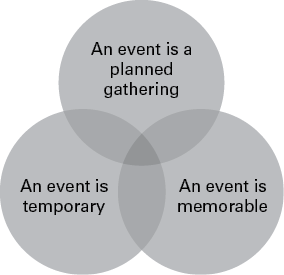
The box below shows some further definitions and descriptions of an event given by some of the leading events management authors:
An occurrence at a given place and time; a special set of circumstances; a noteworthy occurrence.
Getz (2007)
Those non routine occasions set apart from the normal activity of daily life of a group of people.
(Shone & Parry, 2013)
An occasion, a gathering of people at a certain place at a certain time for a specific reason.
(Kilkenny, 2011)
A gathering of human beings, generally lasting from a few hours to a few days, designed to celebrate, honour, discuss, sell, teach about, encourage, observe, or influence human endeavours.
(Matthews, 2008)
Every event experience is unique arising from interactions of setting, programme and people.
(Getz, 2007)
One of the most enjoyable aspects of a career in the events industry is the opportunity to work on a variety of different events. Below we consider some of the main ways of grouping or categorizing events.
Categorization by type
Events are most often categorized according to their type. So, for example, although a family birthday and wedding might be very different, they can both be grouped as private events. Similarly, a business meeting or trade show can be grouped under the category of business events.
Getz Typology of Events is the most commonly used method of categorizing events by type. shows the eight different types of events as categorized by Getz (2007) and includes examples of each.
TABLE 1.1 Getz typology of events
Cultural celebrations | Business and trade | Arts and entertainment | Educational and scientific |
Festivals Carnivals Religious events | Meetings Product launches Trade shows | Concerts Performances Awards ceremonies | Conferences Seminars Training |
Political & state | Private events | Recreational | Sport competition |

